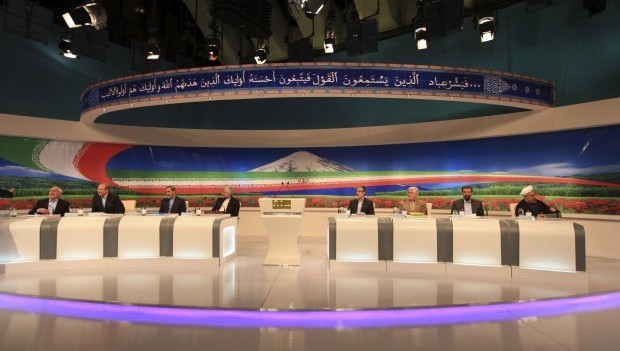
In this photo released by the Islamic Republic of Iran Broadcasting on Friday, May 31, 2013, presidential candidates from left, Mohammad Gharazi, Mohammad Bagher Qalibaf, Ali Akbar Velayati, Saeed Jalili, Gholam Ali Haddad Adel, Mohammad Reza Aref, Mohsen Rezaei, Hasan Rowhani, attend a TV debate in a state-run TV studio, in Tehran, Iran. (AP)
London, Asharq Al-Awsat—Iranian state-run television was accused of intentionally seeking to humiliate the presidential candidates in their first live group debate.
The debate took place on Friday afternoon and saw all 8 candidates asked to sit alongside each other and answer questions in a quiz-style format. The candidates were only granted 90 seconds to answer, and in some cases were even offered multiple choice answers or only permitted to provide yes or no answers.
The majority of Iranian daily newspapers ridiculed the debate format and described the program as a “quiz-show” or “weekly game-show”; alternatively describing it as being boring and laughable. The debate focused solely on economic policies aimed at extracting each candidate’s opinion on various economy-related subjects. The televised debate lasted 4 hours and was divided into two sections: the first-part granted each candidate 3-minutes to present their viewpoints and 90 seconds for rebuttals.
MP Ahmad Tavakolli, who twice ran as a presidential candidate in 1989 and 1993, expressed surprise at the debate format, saying that this served to “degrade the [Iranian] public and the Islamic republic”, according to Khabar Online.
“I am shocked that the candidates tolerated such a humiliating format and did not walk out of the studio,” Tavakolli added.
The campaign of Hassan Rouhani, the moderate candidate who has lately been witnessing a surge in popularity, issued a statement protesting against alleged bias by state-run television against their candidate.
“We have regrettably witnessed a combination of forgery, censorship, and negative false depiction by state-run television [towards Rouhani]. The state-run broadcast agency is a public institution and should observe neutrality towards all electoral campaigns,” the Rouhani campaign noted.
Hassan Rouhani’s popularity has been on the rise since he has been viewed, in some circles, as the only candidate to adequately address his intention and possess a good track record in terms of Iranian foreign policy. Rouhani also has no association with the reformists or opposition camps.
In addition to this, Rouhani is one of two appointees made by Supreme Guide Ayatollah Khamenei to the Supreme National Security Council, largely immunizing him against the usual skirmish tactics used by the radicals to destroy their political rivals in Iran.
Rouhani protested to the debate moderator and branded the program as insult to the presidential candidates and Iranian general public. Debate moderator Morteza Heydari rejected the candidates’ protests and complaints, emphasizing that “the debate format was finalized after we considered 20 different scenarios and following hours of expert consultation.”
Mohsen Rezaie, former commander of the Iranian Revolutionary Guards Corps (IRGC) and a third-time presidential candidate, also protested at the manner in which the debate was handled, warning that it should consider all 8 candidates as potential future presidents, and not seek to humiliate them.
Emad Afrough a former conservative MP and sociologist, also criticized the Iranian presidential debate, saying that it had been formatted with the specific purpose of embarrassing the candidates. According to Afrough, Iran’s state-run television has destroyed the trust between the general public and Tehran.
“Rigged debates such as this will only ensure that distrust grows and participation falls,” Afrough warned.
For his part, Naser Seraj, representative of Iran’s Public Prosecutor-General at the Presidential Election Campaign Regulatory Committee said that feedback from Friday’s debate will be reviewed; adding that future changes to the debate format will take this into account.
Political commentators were bewildered by Friday’s presidential debate, and all news and political analyses included criticism of the debate format. Some media outlets even speculated that the first debate had intentionally sought to disgrace the position of president in the eyes of the Iranian electorate.
These views are in correlation with calls made by some principalist politicians to review Iran’s constitution aimed at removing the post of president and replacing this with a prime ministerial system, thereby avoiding the process of presidential elections.
